David Gosselin
“Trust me, the fountain of youth, it is no fable. It is running
Truly and always. Ye ask, where? In poetical art.”
Friedrich Schiller, The Fountain of Second Youth
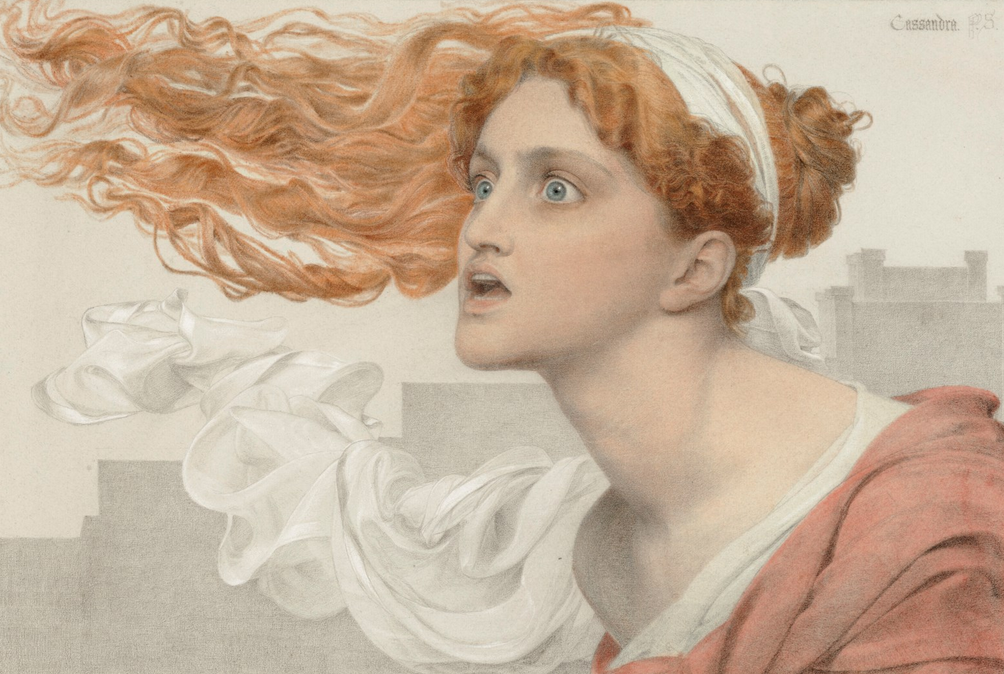
There are prophecies in every age. The doom of empires and the fall of kings remain perennial themes because of their timeless reality. Poets have often been the bearers of these prophecies; in Western civilized culture, this gift of poetical prophecy is chiefly the preserve of the tragic, epic, and biblical traditions. The verses of David’s psalms, the dactyls of Homer and the tercets of Dante immortalized poets’ thoughts and ensured their transmission through enduring poetical forms.
As the poet Percy Bysshe Shelley wrote in his Defence of Poetry (1821):
Poets, according to the circumstances of the age and nation in which they appeared, were called, in the earlier epochs of the world, legislators, or prophets: a poet essentially comprises and unites both these characters. For he not only beholds intensely the present as it is, and discovers those laws according to which present things ought to be ordered, but he beholds the future in the present, and his thoughts are the germs of the flower and the fruit of latest time.
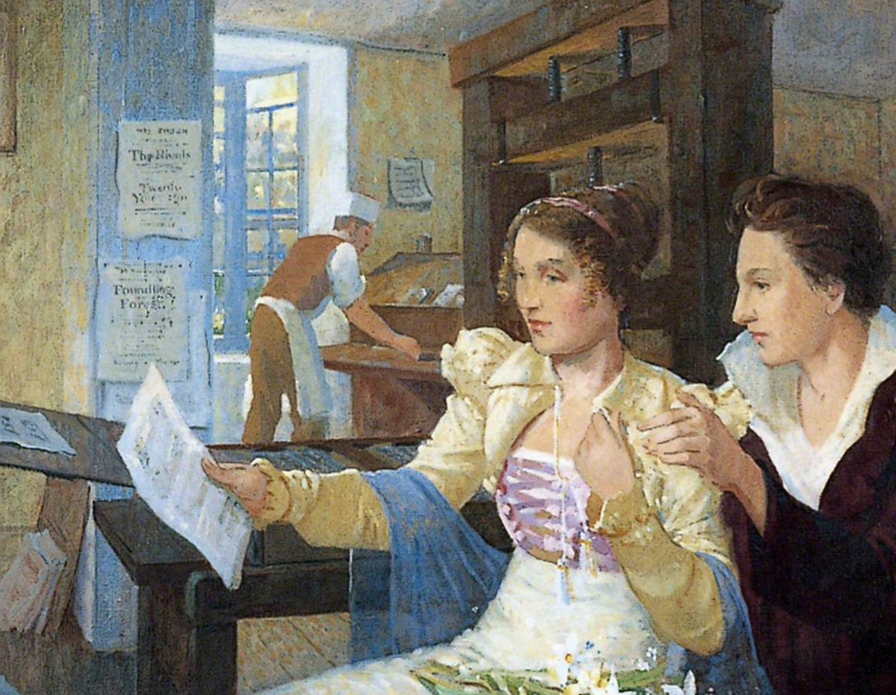
In musical forms, the bards of old ensured their verses would phrase, not only man’s highest thoughts, but the common wisdom of all humankind. With respect to their poetical forms, Shelley wrote:
The grammatical forms which express the moods of time, and the difference of persons, and the distinction of place, are convertible with respect to the highest poetry without injuring it as poetry; and the choruses of Aeschylus, and the book of Job, and Dante’s “Paradise” would afford, more than any other writings, examples of this fact, if the limits of this essay did not forbid citation. The creations of sculpture, painting, and music are illustrations still more decisive.
When we consider the role played by poets in the rebirth of civilizations across the ages, particularly Classical Greece, little by way of civilizational rebirth has been left untouched by what Shelley referred to as poetry’s “secret alchemy”.
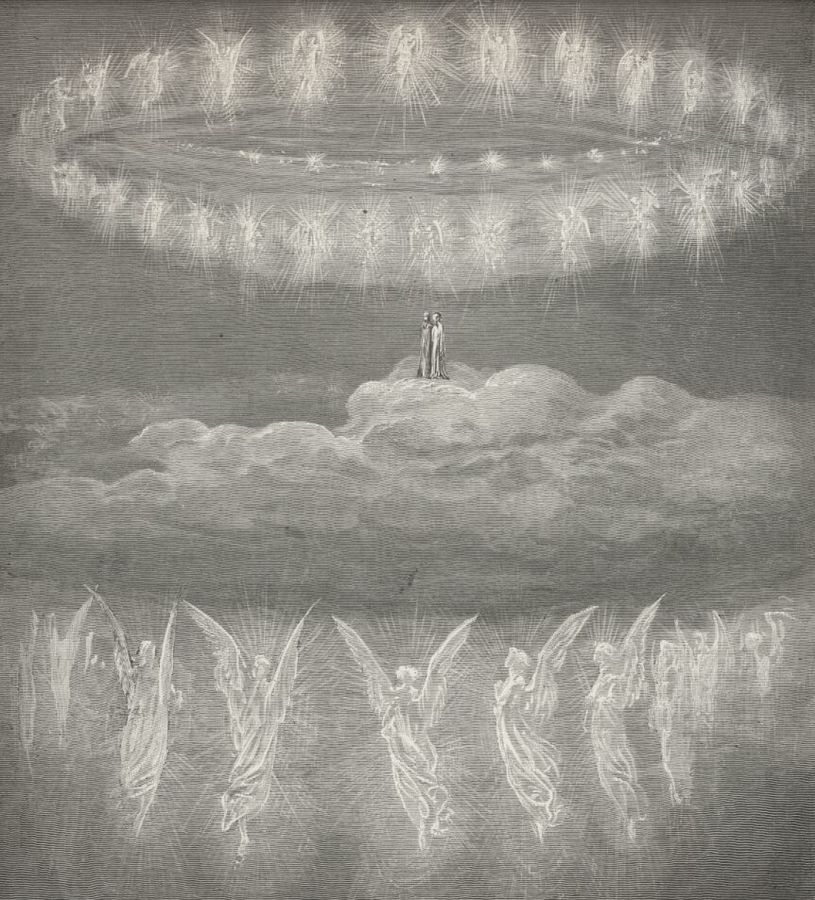
Schiller: A Window into Hellenism
As in any classical age, rebirth begins by intimately acquainting ourselves with the best of our tradition, and situating it within our own unique times. The 18th-century German poet and playwright Friedrich Schiller thoroughly imbibed the wisdom and beauty of the Classical Greeks was, and succeeded in reviving it within his own age, known as the Weimar Classical Renaissance.
Heralded as “the Shakespeare of Germany”, Schiller (1759–1805) presided over Germany’s illustrious classical revolution, alongside Goethe. Many of their poems served as inspirations for composers including Beethoven, Schubert, Schumann and Brahms. No less than Beethoven’s supreme Ninth Symphony was composed as a setting of Schiller’s “An die Freude” (Ode to Joy).
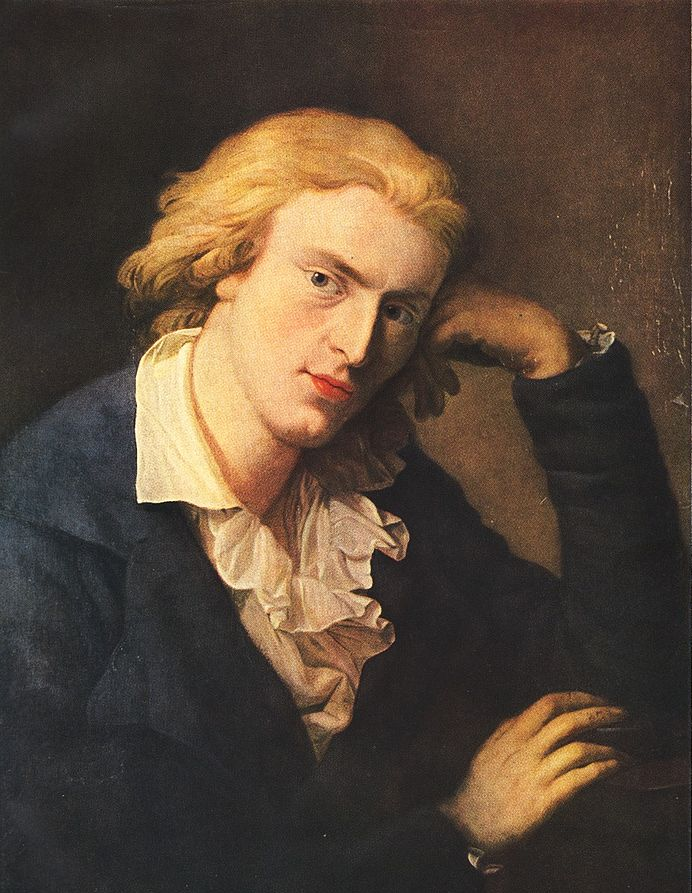
Of Schiller’s epic ballad the “Cranes of Ibykus”, the preeminent Classical philologist Wilhelm von Humboldt wrote in 1797:
There is a greatness and a sublimity [in the Cranes], which is again completely their own. Especially from the moment the theater is mentioned, the depiction is godly. The painting of the amphitheater and the congregation is lively, great and clear, already the names of the peoples transpose one to such happier times, that I know of scarcely anything more magnificent for the fantasy. And then the chorus of the Eumenides, as it appears in its frightful greatness, wanders around the theater, and finally disappears, horrible even then. Here the language is at once so uniquely yours, and so appropriate for the task, that I can not deny that I felt, in the chorus, something greater and something even higher than in the Greek of Aeschylus, as closely as you have followed him. Already this language, this verse-style, even the rhyme scheme make that which is otherwise unique to modern works unite with antiquity. The sublimity for fantasy and heart, which is so unique to Greek expression, achieves here, I believe, an increased greatness for the mind… The Ibycus has… an extraordinary substance; it moves deeply; it shakes one; it fascinates, and one must come back to it again and again. Surprisingly beautiful are the transitions, and you succeeded very well in the difficult narration of the development.[1]
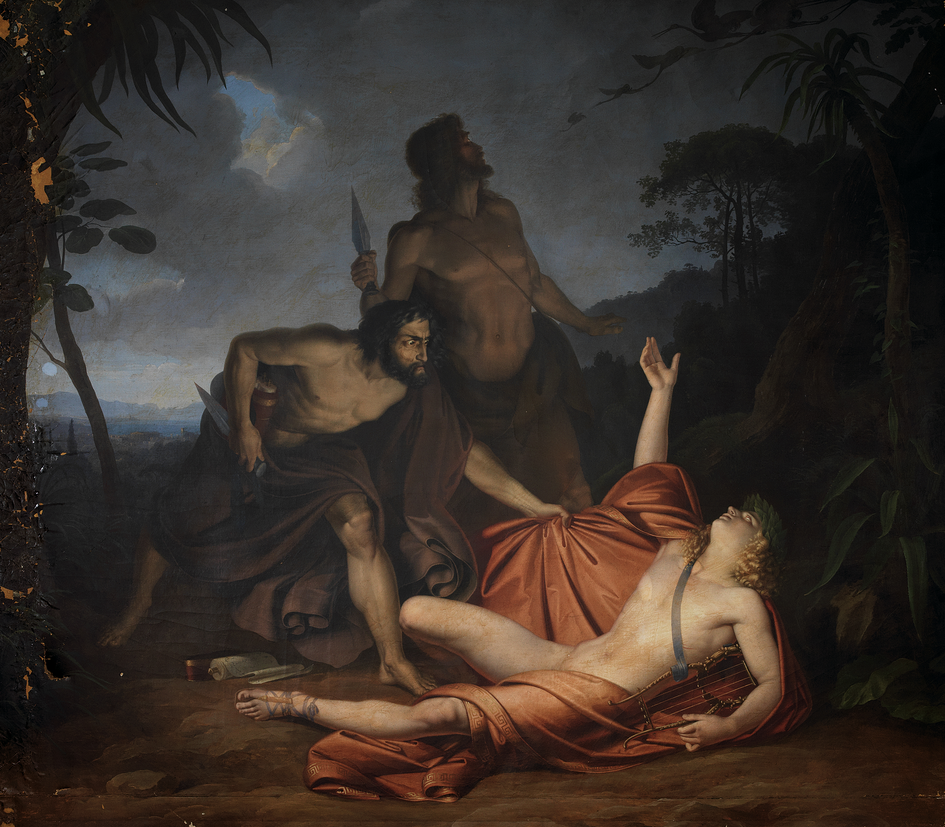
Through a reading of Schiller’s criticism and original works, modern readers discover an intimate view of Greek greatness through the eyes of one of the most successful vanguards of Hellenism in modern history. Passionate about the achievements of Ancient Greece, Schiller observed that the Classical Greeks pioneered the tragic form as we know it, tracing its origins to the Greek chorus. He maintained that the chorus was the binding force of tragic drama, observing that even with its ostensible departure from the stage, the chorus remained the animating spirit of Greek theatre.
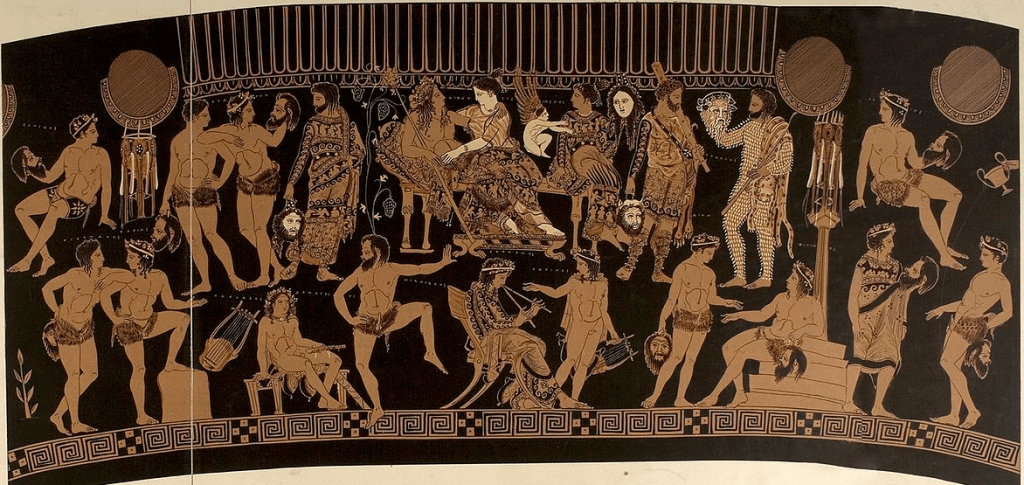
In On the Employment of Chorus in Tragedy, Schiller writes:
The tragedy of the Greeks, as we know, emerged from the chorus. And although it cut itself loose from the chorus historically and in the course of time, one can also say that it emerged from the chorus poetically and in spirit, and that without this perseverant witness and bearer of the action, it would have become an entirely different poetry… Ancient tragedy, which initially dealt only with gods, heroes, and kings, required the chorus as a necessary accompaniment; it found it in nature, and employed it because it found it.[2]
He goes on to discuss the relevance of the chorus principle for modern tragedy and poetry:
The actions and fates of the heroes and kings are public in and of themselves, and were even more so in simple, primal time. The chorus, thus, was more than a natural organ in ancient tragedy; it followed out of the poetical form of real life. In modern tragedy, it becomes an artificial organ, it helps to bring poetry forth… For the modern poet, therefore, the chorus performs a far more essential service than it did for the ancient poet, and just for the very reason that it transforms the common modern world int the ancient poetical one, because it makes everything useless which contends against poetry, and drives him aloft to the most simple, the most original, and most naïve motifs.
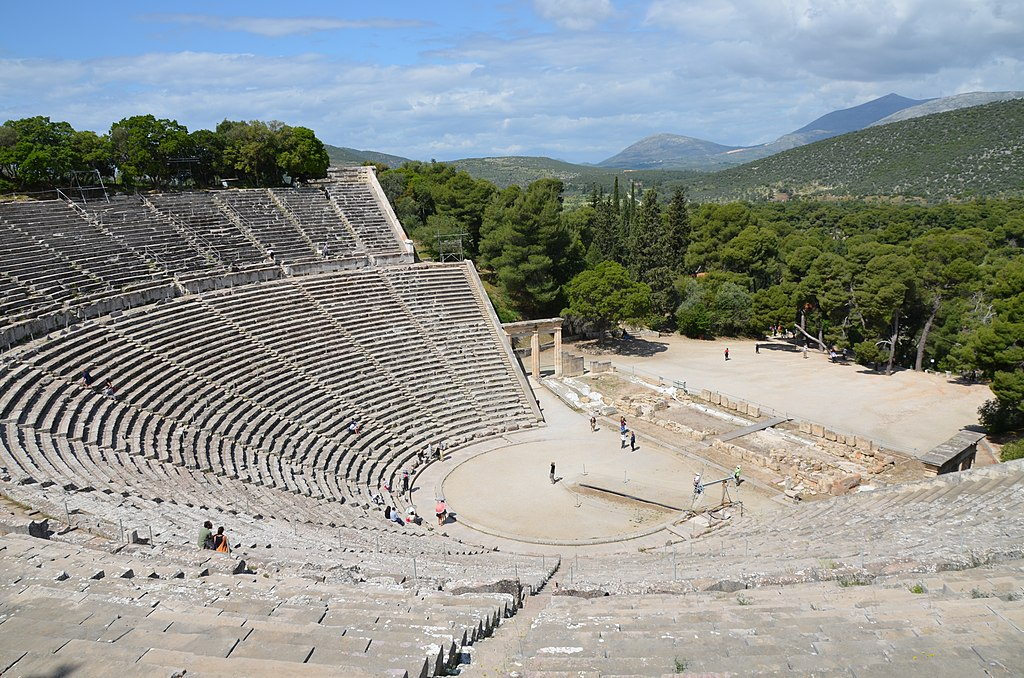
Finally he concludes:
The palaces of the kings are now closed; the courts have withdrawn from the gates of the city into the inner courts of the buildings; writing has displaced the living word; the people itself, the sensuous, living mass, where it does not make itself felt as raw power, has become the state, and thus become a derivative conception; the gods have returned within the breasts of people. The poet must open the palaces once again; he must conduct the courts out under the open heavens; he must resurrect the gods; he must reestablish everything immediate, which has been annulled by the artificial edifice of real life; and he must cast off all artificial concoctions of the person and around him, everything which hinders original character, as a sculptor casts off modern robes, and he must take nothing of the external environment except that which makes the highest of forms, the human form, visible.
With such insights, it’s no surprise that Schiller successfully captured the essence of Greek tragedy within his own era. Rather than merely trying to imitate the outward formal elements of the Classics, Schiller rediscovered their spirit and gave the tradition new life, which is as integral to preserving a tradition as observing its sacred rites or reading its foundational works.
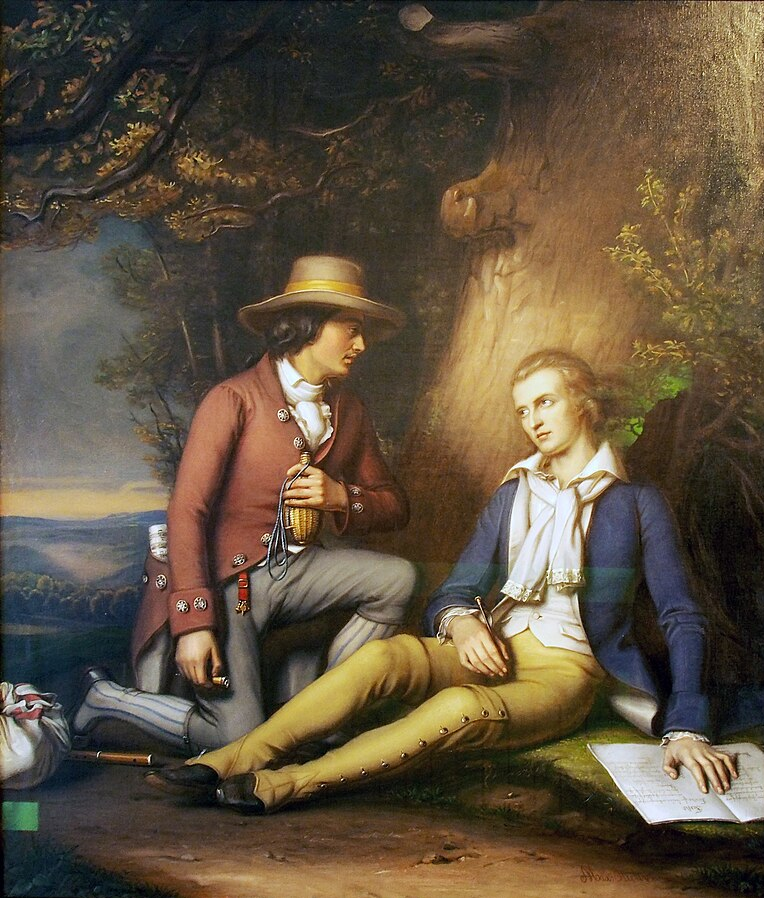
Schiller’s most extensive discussions on the state of the poetical arts and their role in society can be found in Letters on the Aesthetic Education of Man, where he writes of the true artist’s role in a society that wishes to enjoy the pleasures of fine art, and reap its transformative effects on the tastes and morals of a people:
The Artist, it is true, is the son of his age; but pity for him if he is its pupil, or even its favorite! Let some beneficent Divinity snatch him when a suckling from the breast of his mother, and nurse him with the milk of a better time that he may ripen to his full stature beneath a distant Grecian sky. And having grown to manhood, let him return, a foreign shape, into his century; not, however, to delight it by his presence; but terrible, like the son of Agamemnon, to purify it. The matter of his works he will take from the present; but their Form he will derive from a nobler time, nay from beyond all time, from the absolute unchanging unity of his nature. Here from the pure aether of his spiritual essence, flows down the Fountain of Beauty, uncontaminated by the pollutions of ages and generations, which roll to and fro in their turbid vortex far beneath it.[3]
With ballads like “The Ring of Polycrates,” “Cassandra” and “The Cranes of Ibykus”, Schiller managed to infuse Greek pathos and vitality with his own moral and philosophical clarity.
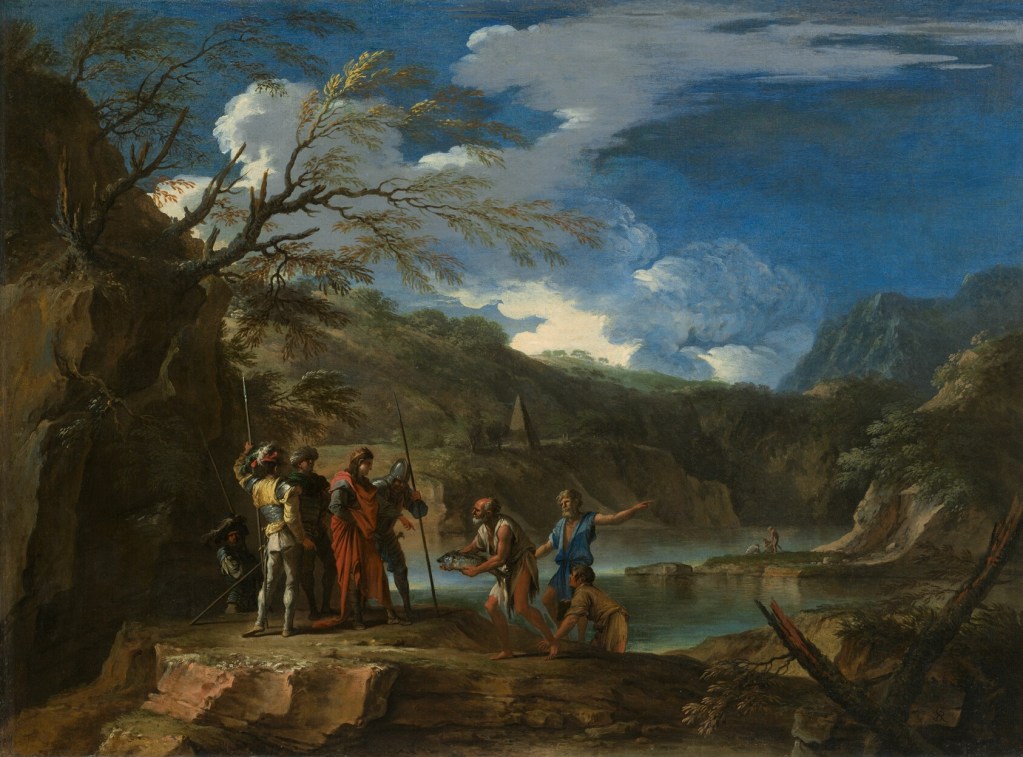
On the Tragic
In Why We Take Pleasure in Tragic Subjects, Schiller examines why tragedy has remained an important and enduring form in Western civilization. He begins by outlining the essential nature of fine art, of which tragedy remains one of the most exalted and moving expressions:
Thus, the fine arts have their purpose in common with nature, or actually with her Author. They playfully grant what [pleasure] their more serious sister allows us to obtain only with labor; they make a gift of what is usually the bitterly won prize of much effort. We purchase enjoyments of the mind with straining diligence, the sanction of reason with painful sacrifice, the pleasure of the senses with austere abstinence, or atone for the excesses of these with a train of suffering; only art affords us pleasures which need not first be earned, which demand no sacrifice, and need not be purchased with repentance.[4]
The performance of a great tragedy affords audiences the opportunity to see the tragic unfold on the stage of their imagination, rather than in real life. For this reason truly tragic art may be said to offer the proverbial “gift of prophecy”.
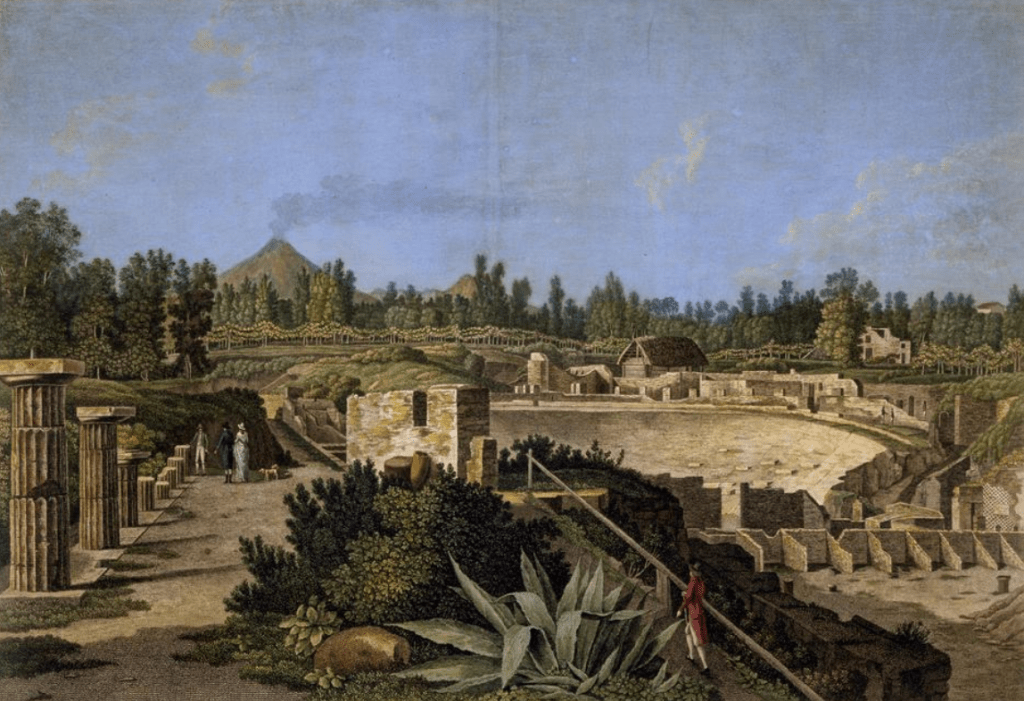
The Case of Cassandra
Take, for instance, the myth of Cassandra, which endures as one of the most emblematic symbols of the poetical-prophetic tradition. To this day, the story continues to inspire new odes and paeans to the proverbial “Cassandras” of the world.
Cassandra foresees the future, but is cursed with the fate that no-one believes her. What are we to make of this? Why should any of us take pleasure in seeing someone tell the truth and never be believed? Schiller describes tragedy as the art which grants audiences the most pleasure and which, for this reason, has the greatest moral effect on our tastes and sensibilities. Why?
The answer lies in “the sublime”. Schiller articulates the nature of the elevated pleasure derived from the sublime as something distinct from the beautiful and commonplace delights drawn from any other kind of amusement.
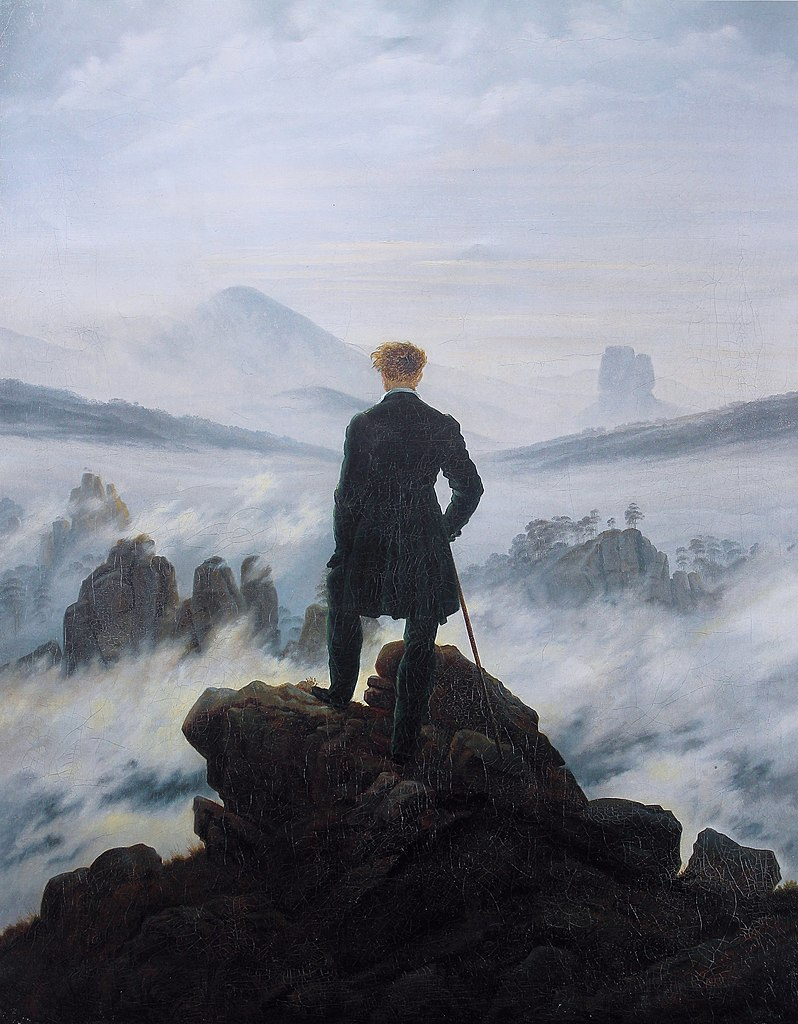
In On the Sublime, he writes:
The feeling of the sublime is a mixed feeling. It is a combination of woefulness, which expresses itself in its highest degree as a shudder, and of joyfulness, which can rise up to enrapture, and, although it is not properly pleasure, is yet widely preferred to every pleasure by fine souls. This union of two contradictory sentiments in a single feeling proves our moral independence in an irrefutable manner. For as it is absolutely impossible that the same object stand in two opposite relations to us, so does it follow therefrom, that we ourselves stand in two different relations to the object, so that consequently two opposite natures must be united in us, which are interested in the conception of the same in completely opposite ways. We therefore experience through the feeling of the sublime, that the state of our mind does not necessarily conform to the state of the senses, that the laws of nature are not necessarily also those of ours, and that we have in us an independent principle, which is independent of all sensuous emotions.[5]
Cassandra shuns the advances of the enthralled god Apollo to preserve her chastity and integrity. The god punishes her by turning her gift of prophecy into a curse: she will see the future, but no-one will believe the truth she foresees.
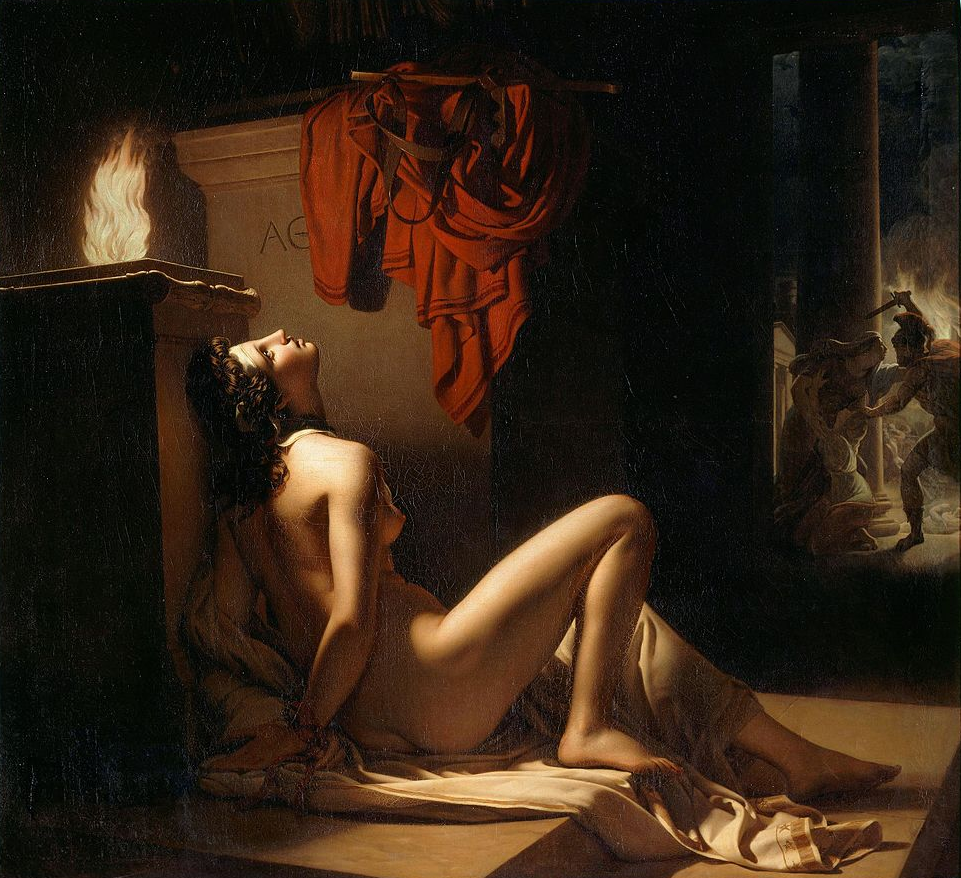
The anguish we feel when presented with the plight of tragic figures causes us to discover in ourselves a faculty which we otherwise find nowhere else. We find ourselves conscious of an independent principle which transcends the natural condition to which all other beings are relegated. Schiller observes that only when we can freely choose the anguish of the sublime over the pleasures of illusions are we truly free.
Schiller concludes On the Sublime thus:
Does one now remember, what value it must have for a being of reason, to become conscious of his independence of natural laws, so one comprehends how it occurs that men of sublime bent of mind can hold out for compensation, through this idea offered to them of freedom, for every disappointment of cognition? Freedom, with all of its moral contradictions and physical evils, is for noble souls an infinitely more interesting spectacle than prosperity and order without freedom, where the sheep patiently follow the shepherd and the self-commanding will is degraded to the subservient part of a clockwork. The latter makes man merely into a spirited product and a more fortunate citizen of nature; freedom makes him into the citizen and co-ruler of a higher system, where it is infinitely more honorable, to occupy the nethermost place, than to command the ranks in the physical order.
The great irony of tragic art is that it is by virtue of the pleasure derived from the tragic that one is moved to the highest delight – that of seeking Justice and the Good. Through the tragic, we take joy in perfection because the discovery of its absence highlights its ultimate primacy over all other spheres of human activity. This revelation, while “not properly pleasure”, Schiller observes, “is widely preferred to every pleasure by fine souls.”

Cassandra
By Friedrich Schiller
I.
Joy resounded through the Trojan
Halls as the songs of lutes swelled;
Hymns were chanted by the drunken
Soon before the towers fell.
Weary heads now calmly rested,
Tears no longer plagued their eyes;
Peleus was soon expected
With his noble bride to rise.
II.
Troops with temples wreathed by laurel
Filled the sanctums of the gods;
All retiring, proudly marching
To the Thymbrian altar halls.
Streets were thriving with the madness
Of the dance-crazed bacchanal;
Yet forgotten in her sadness
Was but one unhappy soul.
III.
Everywhere Cassandra wandered
She was met with joy and cheer.
Still, she roamed Apollo’s orchards,
Haunted by her prescient fear.
She took refuge in the deepest
Acres of a sacred forest,
And flung in a raging tempest
Bindings of her priestly caste.
IV.
“Everyone rejoices proudly,
Every heart feels greatly blessed;
Parents look on hopefully
At my sister sweetly dressed.
I alone must mourn this moment,
Letting each dream flee my sight;
I alone must reckon ruin
Scale our walls once shining bright.
V.
“One dim, simple flame is glowing,
Though not held by Hymen’s hand,
Fires leap towards the Heavens,
Yet not burning from our brand.
Feasts before me I see lavished,
Yet my prophesying heart
Hears the crying and the anguish
Tearing all our joys apart.
VI.
“They all mock my lamentation,
My grief only eggs them on;
Lonely in my desolation,
Helpless, I must carry on.
Shamed by those who reap sweet fortune,
Blighting all their happiness;
I’m the herald of destruction,
Oh, immortal Pythias!
VII.
“Why have I been cursed so coldly,
Cast among the ever-blind?
Every day is dark and lonely
All because of my clear mind.
Why grant me the gift of forethought
If tomorrow can’t be changed?
The predestined can’t be altered—
Destiny remains unchained.
VIII.
“Why remove the sacred cover
If such terror can’t be stopped?
Life is fraught with endless error—
Knowledge of it leads to naught.
Take, oh take, this curse away now,
Rid me of this bloody sight;
Terror overwhelms the mortal
Witness of Truth’s burning light.
IX.
“Give me back my happy blindness
And a mind forever blind;
All my songs are spent of kindness,
Since your will has been divined.
With the future I am gifted,
In exchange the present flits;
All my joyful hours are wasted—
Spoiled are all this world’s sweet gifts!
X.
“Never has the bridal wreathing
Decked my young and virgin brow,
Since I heard my fated calling
As the keeper of this vow.
My best days are spent in weeping,
Pain is all my pure heart knows,
Now an overwhelming meaning
Conjures in me endless woes.
XI.
“Carelessly strolls every couple,
Laughing, loving, full of heart.
All arrayed in garbs so youthful—
In my heart alone joys part.
Springtime’s buds seem all in vain
As they blanket Earth with bliss;
Who could enjoy life when staring
Into fate’s gaping abyss?
XII.
“Polyxena appears so blest
In her drunk, delusioned breast,
For, the best of Greece would wed her,
And their loving vows profess.
Confidently bears she her proud heart,
Joy erupting at the seams;
Even gods with their immortal art
Are not envied in her dreams.
XIII.
“He to whom my troth was plighted,
Who so honors my fair charms,
Looks on me with passioned gazes,
Calling me into his arms.
Gladly would I marry that man,
Make a loving home for him,
But the Stygean shades nightly ban
Our happy fate and loving.
XIV.
“All her omens and foreboding
Proserpine has given me;
Wherever I tread or wander
Ghostly spectres follow me.
All the joys of youthful pleasure
Are extinguished by these shades;
Overwhelming in their number,
They hound me through streets and glades.
XV.
“Spectres of the death-steel shining
And the eye of murder glow;
There’s no chance of our escaping,
There’s no place where we may go.
Haunted daily by my prophecy,
No one can avoid Fate’s hand,
I must welcome my destiny:
Dying in a foreign land.”
XVI.
As her plaintive songs still echo,
A distant voice is heard
From the gates of the chief temple:
Thetis’ son has left the world!
Eris with her serpents screeches,
All the gods have swiftly flown;
Looming thunderclouds now rumble,
Heavy over Ilium.
Translation © David B. Gosselin

David Gosselin is a poet, translator, and researcher in Montreal, Canada. He is Editor-in-Chief of The Chained Muse. His epic poem in iambic blank verse, Athena, is featured in the latest issue of New Lyre Magazine. His poems, recordings and historical deep-dives can be found on Substack at Age of Muses.
Notes
| ⇧1 | Letter of 7 December, 1797, translation taken from Rosa Tennenbaum, “1797, The ‘Year of the Ballad’ — In the Poets’ Workshop,” Fidelio 7.2 (Spring 1998) 61–77, at 76. |
|---|---|
| ⇧2 | Friedrich Schiller, The Bride of Messina, Prologue (1803), translation here and in the next two excerpts taken from G.W. Gregory (trans.), Friedrich Schiller: Poet of Freedom Vol. 4 (Schiller Institute, Washington, DC, USA, 2003). |
| ⇧3 | Translation by Thomas Carlyle, from his Life of Friedrich Schiller (London, 1825). |
| ⇧4 | Translation taken from G.W. Gregory (trans.), Friedrich Schiller: Poet of Freedom Vol. 4 (Schiller Institute, Washington, DC, USA, 2003). |
| ⇧5 | Translation here and in the following excerpt taken from W.F. Wertz, Jr (trans.), Friedrich Schiller: Poet of Freedom Vol. 3 (Schiller Institute, Washington, DC, USA, 1990). |